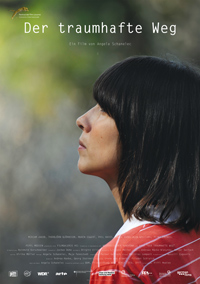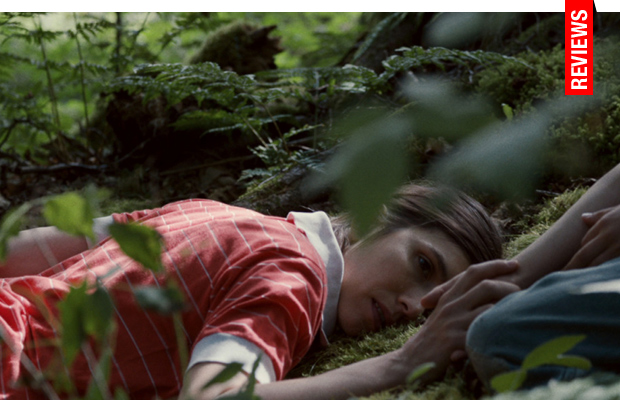Reviews
The Dreamed Path | 2016 Toronto Int. Film Festival Review
Scenes from a Fugue State: Schanelec Returns with Abstract Continuum of Dissolved Relationships
 “I don’t know where to put myself,” says a character at one point early on in director Angela Schanelec’s seventh feature, the sometimes bewildering but increasingly fascinating The Dreamed Path. It’s a statement easily usurped by members of the film’s audience as they try to find their bearings in a film of abstract fragments relating to the dissolution of two unrelated heterosexual German couples thirty years apart. Instead, repeated gestures, images, and customs seem to take the place of expositional interconnectedness between both the couples and their near esoterically designed interactions. As likely to alienate some as it is captivate others, Schanelec’s carefully determined efforts enhance the level of spectatorship in a superbly designed visual pattern of codes and cues. Although core issues are left undefined or understated, a degree of unavoidable poignancy culminates in the second half, depicting humans going through the same motions despite the onslaught of time or political climate, intersecting with the lives of others in an ebb and flow as they create their own peculiar rigidities amidst this stasis.
“I don’t know where to put myself,” says a character at one point early on in director Angela Schanelec’s seventh feature, the sometimes bewildering but increasingly fascinating The Dreamed Path. It’s a statement easily usurped by members of the film’s audience as they try to find their bearings in a film of abstract fragments relating to the dissolution of two unrelated heterosexual German couples thirty years apart. Instead, repeated gestures, images, and customs seem to take the place of expositional interconnectedness between both the couples and their near esoterically designed interactions. As likely to alienate some as it is captivate others, Schanelec’s carefully determined efforts enhance the level of spectatorship in a superbly designed visual pattern of codes and cues. Although core issues are left undefined or understated, a degree of unavoidable poignancy culminates in the second half, depicting humans going through the same motions despite the onslaught of time or political climate, intersecting with the lives of others in an ebb and flow as they create their own peculiar rigidities amidst this stasis.
Young German lovers Theres (Miriam Jakob) and Kenneth (Thornjorn Bjornsson) are making their way through Greece in 1984, singing for their supper and enjoying the overall sense of hopeful camaraderie all around them just as the country is set to join the European Union. But when Kenneth receives devastating news about his mother, he is forced to return to England while Theres snags a traineeship in Berlin. As each deal with wildly staggering new scenarios, these drastic changes drive them apart emotionally. Without the assistance of a formal transition, the timeline skips moves forward thirty years to Berlin-based actress Ariane (Maren Eggert), grappling with addiction issues and a dead-end marriage with her anthropologist husband David (Phil Hayes). Asking for a divorce, they begin to disengage from one another (a conscious uncoupling, if you will), their new orbits now peripherally incorporating the couple from the first segment as Theres is a single mother living in the same apartment complex and Kenneth is a homeless man who alights nearby outside.
Schanelec’s impressive cinematic accomplishments always begs the question as to why she’s still relatively unknown outside of Germany, lumped in with the Berlin School of filmmakers, whose most internationally renowned members (such as Christian Petzold, Maren Ade, Dominik Graf) have only recently enjoyed critical success outside their native country. Besides directing a segment in the 2014 omnibus Bridges of Sarajevo, this is her first actual feature since 2010’s Orly, and it’s difficult to obtain copies of her back catalogue due to a lack of US distribution. The neglect is most likely due to Schanelec’s ambitious demands on her audience, shirking even the performances of her actors to focus on objects, appendages, and movements. It opens on a precariously misleading note when its first couple sweetly sings a rendition of “The Lion Sleeps Tonight,” a tone blasted away immediately, returning once, and quite vibrantly as a swell of non-diegetic music blasts over a woman’s visit to the doctor’s office. In the 1984 segment, a woman shouts joyfully about the hopeful promise of Greece joining the European Union, and we gaze upon people trying to tame a floundering “Banner of New Europe,” an image later repeated with a snagged piece of toilet paper from an actress’ backside in the later period.
Each frame of The Dreamed Path (lensed by DP Reinhold Vorschneider, who also regularly works with Benjamin Heisenberg) is filled with visual cues, such as when Kenneth finally arrives at the hospital to visit his dying mother. An aide is seen to be emptying the dead, wilted flowers from the patients’ rooms, signaling he’s already too late to witness his mother in any real fighting form. The sequences following this are predicated on Kenneth, allowing Bjornsson the most emotionally expressive performance as he sobs emotionally over a plate of food. Schanelec prizes the perspective of feet, legs, the movement of hands, a laconic observation of information relayed by gestures. The packing and unpacking of suitcases, a conditioned ritual, is also repeated here.
The troubled actress Ariane is initially an absence, an almost imperceptible mention of rehab suggests her lack of involvement with her child. Her position and role is reasserted upon her when she walks in late to a doctor’s office where her child is being treated for a broken limb. Wearing a frumpy shirt with cosmic imagery on it, her husband announces her as his wife, even though she won’t be much longer—but as the life force in her child’s universe, this is a role she can never escape. Her husband’s lingering over a volume of Kleist would also seem to have a degree of subtext, for their existence has been like a domestic drama, as indicated by Ariane abandoning a mask on the kitchen table (the domestic stage). Likewise, the brief reappearances of Theres and Kenneth finds them wearing the exact same clothing they were thirty years prior, suggesting little else has changed about them, except Theres has established a life for herself (“I’m going to be a teacher like my mother. Do you think that’s boring?”) while Kenneth’s unrealistic pursuits in music have left him homeless on the streets.
A final sequence, uniting its alternating characters in the mise en scene, shows Ariana being interviewed. As she explains her love and desire to act, and how her profession doesn’t alleviate loneliness, she’s asked if her career is not merely “a substitute for conversations that you couldn’t have.” And so, perhaps The Dreamed Path, in its examinations of dissolved relationships is very subtly suggesting, in title and form, our expectations and desires are merely fantastical projections, eventually ravaged by the inevitable reality of our lives and the monotonous succession of days. The banner of a hopeful new European union is then merely a wisp of toilet paper drifting precipitously in the wind. Nothing more.
Reviewed on September 12th at the 2016 Toronto International Film Festival – Wavelengths Programme.
86 Mins.


























